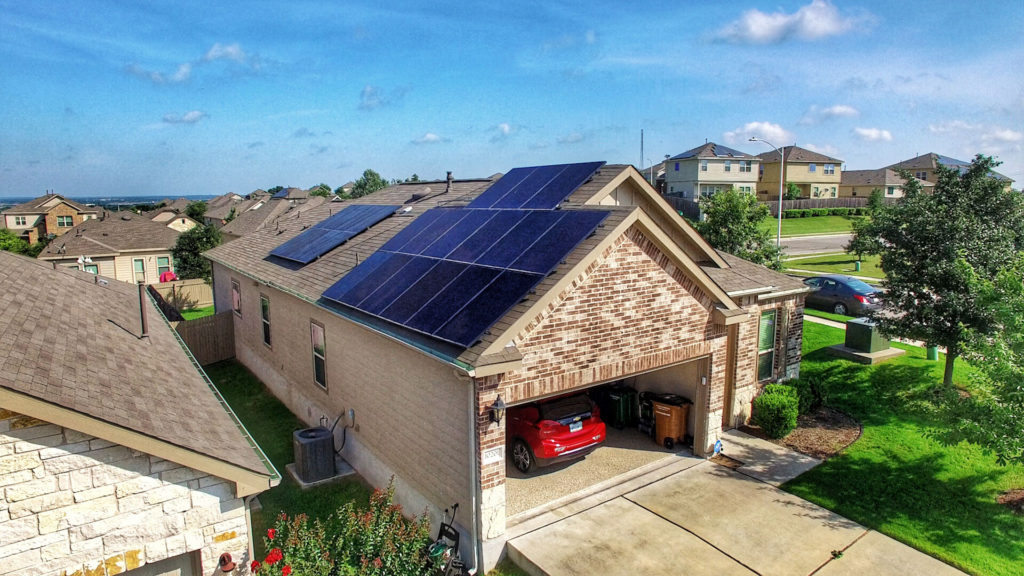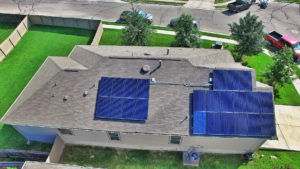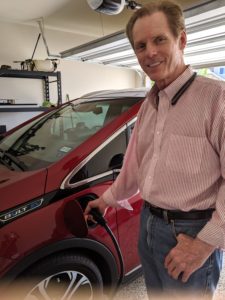Austin Homeowner Has Not Paid an Electric Bill in More Than Four Years

A view of Eric Loften’s solar panels from above.
By Ron Zagarri, TXSES
August, 2019
Quick, name one thing that beats the comfort and convenience of modern electricity service coupled with the low carbon footprint of a grid-tied solar system? Answer: a grid-tied solar system that completely eliminates those pesky monthly electric bills.
Since installing rooftop solar in 2014, Austin resident Eric Loften has never paid an electric bill.
Like most people, Eric has more important things to think about than electric service. He relied on his solar installer to design and install a system suited to his needs. The installer also worked with the local utility to connect the system to the grid.
However, Eric was fortunate when he decided to purchase his home in the Austin Energy service territory, as Austin is one of the most solar-friendly cities in Texas. In addition to providing a rebate to help with the installation of a residential solar system, Austin offers an innovative value of solar rate for the energy a rooftop system generates.
I sat down with Eric to learn about his experience over the past four-and-a-half years. This interview has been edited for clarity and length.

North facing view of solar array with an unobstructed southern exposure.
Ron: What got you interested in installing a solar system for your home back in 2014?
Eric: A vendor display at a local Home Depot. The Enphase vendor rep explained the benefits and described how Austin Energy was offering an incentive rebate to assist with the cost of materials and labor. He had brochures for solar panels and contact information for an installer. I contacted the installer, Native Solar. They assessed my needs, gave me a proposal, and I accepted. I should note that the orientation of my home was fortunate due to the unobstructed southern exposure of my roof.
Ron: Looking at your historical records, I see your 5,750-watt solar system generates an average of 8,300 kWh of electricity each year, and you use about 8,100 kWh, which suggests your system is perfectly sized to handle your load. All that aside, is there a particular portion of your monthly utility statement that you bother to read?
Eric: Only the bottom line— is there a balance due or a credit? Otherwise, the details of my solar production and electricity usage are not easy to understand as a solar layman.
Ron: How did you decide to finance your solar system? Cash, loan, monthly lease?
Eric: I utilized a loan program that the installer recommended. I am pleased that I will be able to pay off the loan early, in just one more year, thanks in part to not having any electric bills since the system was installed.
Ron: Frankly, the aspect of your situation that interested me most was that you are similar to the vast majority of people: you’re not concerned with the technical details and simply want to do your part for the environment while saving some money in the process. Is that a fair assessment of your solar experience?
Eric: Yes. I was aware enough that solar panels could help reduce my carbon footprint and that I could play a role in helping our planet. It was a “feel good” thing for me. I also liked that the combination of the Austin Energy rebate, the federal solar income tax credit on my 2014 tax bill, and the elimination of the monthly electric bill offset most of my monthly payment for the amount financed.
 Ron: In your 1,700-square-foot home, your electricity usage is under 700 kWh per month, which is less than the average Texas homeowner. Do you consciously do anything special to keep your electricity usage so low?
Ron: In your 1,700-square-foot home, your electricity usage is under 700 kWh per month, which is less than the average Texas homeowner. Do you consciously do anything special to keep your electricity usage so low?
Eric: In some ways, yes. I have a programmable thermostat adjusted to my wake, leave, return, and sleep schedule. During the day, I make a point of keeping the blinds closed. I also installed ceiling fans in rooms I use often, which allows me to set the thermostat a bit higher and still feel comfortable.
Ron: Just this past December, you purchased an electric vehicle that you charge at home. Why did you choose an EV, and have you noticed a significant increase in your electricity usage?
Eric: The EV was a natural extension of the solar panels. Again, it gave me an opportunity to do my part to reduce emissions and oil consumption. Yes, I’ve noticed an increase in electricity usage, but not enough, so far, to trigger an electric bill. Let’s give it a full year to see how that plays out. I have noticed my credit balance being reduced each month, but we’ve had an unusual number of rainy/cloudy days in recent months. Also, my system required maintenance recently to replace a couple of failed parts that had temporarily lowered production. This issue was corrected and the sun has come back out with a vengeance. So, let’s see how it goes.
Ron Zagarri serves on the TXSES board and is editor of the Solar Reflector.
